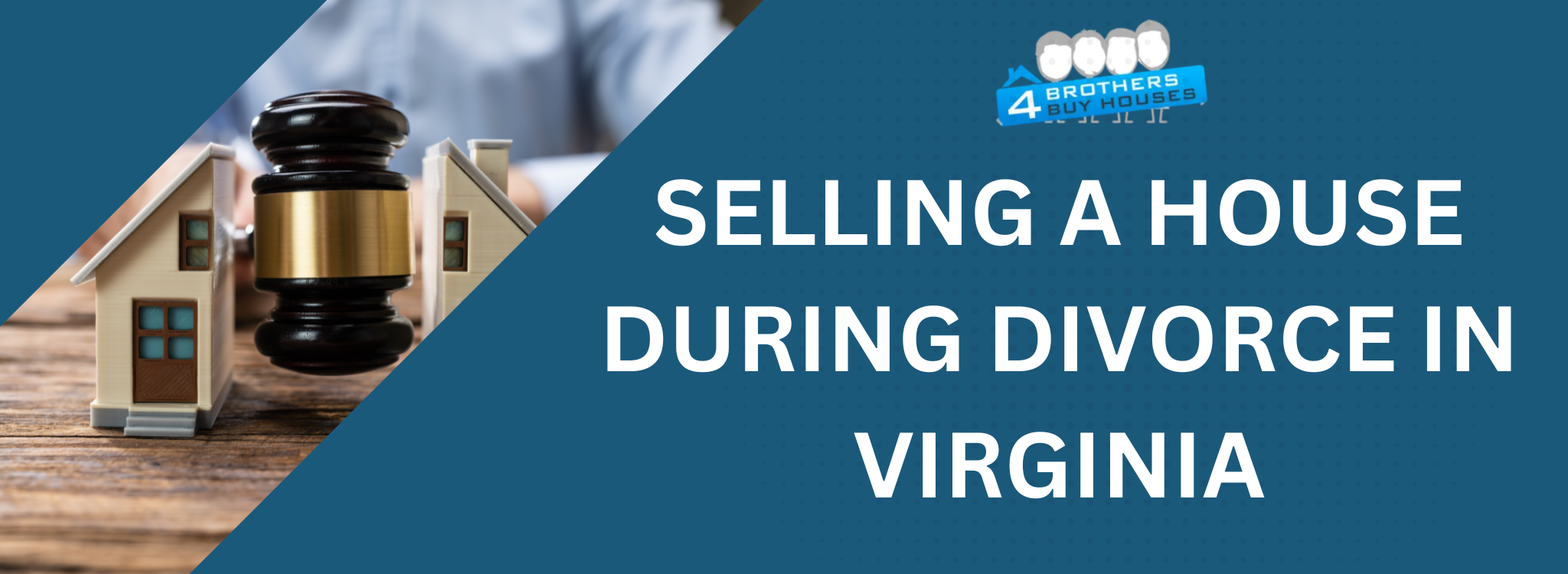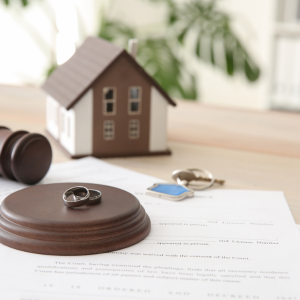
Selling a House During Divorce in Virginia: A Guide to House During Virginia Divorce
Divorce can be difficult and emotional, particularly when selling a home. Negotiating the complexities of real estate during divorce in Virginia necessitates a thorough understanding of state laws and prudent financial planning. This book contains critical information for Virginia couples considering selling their home after divorce. From understanding equitable distribution and property rights to effectively managing the sale process, we want to give you the information you need to make sound decisions. Let us help you through this transitional period with expert advice and practical tips.
How Does Selling a House During Divorce in Virginia Work?

Divorce homeowners face family law and real estate issues when selling their Virginia home. Virginia divorce and property laws are needed to sell a house during a divorce. Property distribution in Virginia divorces may affect house sales. Virginia divorces share all marital assets, including your home. Divorced spouses may sell their home for settlement or practicality. Virginia divorcees selling a home must balance emotions and finances.
Realty details include who gets what is needed to sell a home. Virginia divorce property splits house sale proceeds. Financial pressures, home purchase contributions, and post-divorce property and maintenance may affect this distribution. One party seeking ownership or accepting a financial offer to simplify the settlement may also affect the need to sell. Virginia law ensures fair housing possession during sensitive family restructuring.
Real estate and divorce experts can help you sell your home during stress. A qualified real estate professional can help both parties sell the house fairly. An expert can inspect the home and assets or analyze offers, preventing disputes and simplifying the process.

Virginia family law specialists can advise. They ensure Virginia divorces are legal and real estate distributions reflect marital wealth. Based on legal and financial factors, they may recommend selling the home before or after divorce. Virginia law allows a court to decide on a property and approve a house transaction, requiring experienced lawyers.
Virginia divorce laws allow out-of-court agreements to keep and refinance a marital home. Understanding the options can help divorcing spouses make good emotional and financial decisions. Divorced Virginia homeowners must understand legal and personal goals to sell. In this crucial moment, careful handling and informed decisions can calm everyone.
Who Gets the House During a Divorce in Virginia?

Determining who gets the house in Virginia divorce is difficult and emotional. In Virginia divorce cases, equitable distribution divides property and obligations. “Equitable” doesn’t always mean equal. The Virginia divorce court considers each spouse’s family contribution, financial status, and personal circumstances to determine who keeps the home.
Home is marital property unless proven otherwise. This can occur if one partner owned or inherited the home before the marriage. The mortgage and improvements can be paid with marital funds, making the home part of the estate. Understanding Virginia family law’s property and asset division is essential for divorce. Legal professionals should help spouses divide independent and marital assets.
Most courts encourage peaceful property division. If unsuccessful, the court distributes assets, including the house. Courts regularly determine who has legal and financial rights to the home. Kids’ needs, like school proximity or neighborhood familiarity, can also affect who keeps the house during the Virginia divorce.
Family law and strategy are crucial when divorcing property and debts. When dividing, spouses should consider mortgage payments and taxes before making snap decisions. Housing ownership disputes can lead to court-ordered sales, and settlement requires both parties to share proceeds.
Who gets the house after a Virginia divorce can be emotionally and financially difficult, so each spouse must protect their financial future while navigating legal limits and personal attachments to the family property. Spouses should consider mediation to avoid court intervention and reach a fair settlement. A family law attorney can protect one’s interests and ensure a fair asset allocation during the Virginia divorce process. Each decision has lasting effects.
Should I Sell the House Before or After the Divorce?

Many Virginia couples struggle to decide whether to sell their house before or after divorce. Timing and finances are factors. Selling the house during the divorce may allow for a clean break and easier asset division. To choose the best option, weigh the pros and cons.
Sold houses during divorce help both parties move forward financially without shared property. By selling before divorce, couples can resolve financial issues faster and simplify property division. It may also help each party buy new homes or stabilize their finances faster, which can help start over.
However, selling after divorce may benefit those who prefer to wait for better market conditions or need time to adjust emotionally. Selling after divorce lets each party rebuild without the pressure of selling a shared asset. If real estate values rise, waiting may maximize the sale price, benefiting both parties financially.

To choose the right sale date, consult Virginia lawyers and financiers. Expert advice can clarify whether a judge can influence the sale and help navigate legal complexities while protecting everyone’s interests. Open communication with your spouse and advisors will help determine the best approach for your unique situation, ensuring a fair and balanced outcome.
Can a Judge Force the Sale of a House During Divorce?

Virginia divorcing couples worry about a judge forcing a house sale. Virginia courts have broad authority over divorcing parties’ real estate, and a judge can order the sale of the marital home. Court intervention is usually needed when parties cannot agree on property division. Although parties should try to resolve property disputes amicably, the court may order a sale to ensure fair asset distribution.
If a couple cannot agree on what to do with their home, the court may order a sale to divide proceeds fairly. Virginia divorce law considers each spouse’s financial situation and contributions to marital assets when dividing property. If selling the property is best, it maximizes fairness and protects everyone. Selling a house during a divorce isn’t ideal, but it’s often necessary for a balanced outcome.
Parties try independent settlements because a judge may order a home sale. Couples benefit from legal and real estate advice on how the judge may view their case. Changing a judge’s decision is difficult without appeal. Knowing the court’s property division discretion helps Virginia couples prepare and make decisions as they navigate divorce.
Who Retains Ownership of the Property After Divorce?

Many Virginia couples struggle to divide marital property during divorce. Most divorces base property ownership on acquisition, financial contributions, and spouse intent. Understanding the law can help pretty divide assets, including the family home. Legal procedures complicate marital asset division and house distribution. Virginia’s equitable distribution laws require fair but not equal marital property distribution. Virginia divorce courts determine house ownership unless both spouses agree.
The court may consider several factors when deciding which spouse keeps the property. One spouse may need to “buy out” the other’s share of the house to keep it during and after divorce. Married couples could sell the house and split the proceeds. Avoid financial problems by communicating who will pay the mortgage until the divorce is final.

Couples often struggle with mortgage payments and house maintenance during divorce. Whether one spouse lives in the house during the divorce and who raises the kids may affect ownership. Although emotional attachment to the property is essential, affordability should be considered post-divorce housing.
Virginia divorce property ownership requires thought and possibly legal assistance. A qualified attorney can advise divorcing spouses on home law and asset negotiations. Choose a property owner based on future finances. All options, including selling the property, can help spouses meet their needs and finances. The following sections will discuss alternatives to selling the marital home for asset management during and after divorce.
What are the Alternatives to Selling a Marital Home During Divorce?

Divorce in Virginia can be challenging, especially when deciding the fate of the marital home. While selling the house is common, other options may better suit each spouse’s financial stability, emotional attachment, and future goals.
One spouse may keep the home by buying out the other’s share and refinancing the mortgage, which can help if there’s a desire for stability or a strong attachment to the property. Alternatively, temporarily co-owning the house allows both parties to cover mortgage payments, letting the home appreciate value before a sale.
Renting the home is another option if neither party wants to keep or co-own it. This can generate income to cover divorce-related expenses until market conditions improve, although being a landlord requires clear agreements on management.
If both parties cannot agree, a judge may intervene, potentially ordering a sale to ensure fair asset division. Some companies also offer quick cash buys, which can provide immediate funds. Consulting a lawyer and real estate professional can help divorcing couples navigate these choices and reach a fair resolution.
This information applies to Virginia and its cities, including Alexandria, Arlington, Fairfax, and Reston. For more details, please call us at 202-601-4928 or visit our website at 4 Brothers Buy Houses.


